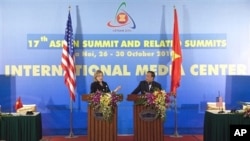The United States Secretary of State Hillary Clinton offered to hold three party talks with China and Japan to try to cool tensions between them. Clinton made the offer as heads of state from sixteen Asia and Pacific countries met in Vietnam for the East Asia Summit. Clinton also urged host Vietnam to improve its human rights record.
The U.S. secretary of state says she offered to facilitate dialogue between China and Japan to help ease tensions over a territorial dispute in the East China Sea.
Beijing reacted angrily in September when the Japanese navy detained a Chinese fishing boat near the disputed Senkaku islands, known as the Diaoyu islands in China.
Industry insiders say Beijing responded by cutting off exports of rare minerals to Japan, a charge that China denies.
Clinton said at meetings in Hanoi she got what she called a clarification from China's Foreign Minister Yang Jiechi that Beijing would not withhold the rare minerals from any markets.
She told journalists Saturday she also encouraged both Japanese and Chinese officials to seek a peaceful resolution to the disagreement.
"And, we've recommended to both that the United States is more than willing to host a trilateral where we would bring Japan and China and their foreign ministers together to discuss a range of issues," she said.
Clinton made the proposal on the sidelines of the East Asia Summit, where regional leaders gathered for talks on economic, security, and political issues.
But it was not clear if the Chinese or Japanese would consider the offer.
Clinton said Washington has no position on the sovereignty of the islands but repeated that the territory was part of a U.S. defense commitment to Japan.
Beijing voiced dissatisfaction over the U.S. position and accused Japan of making untrue statements at the summit, ruining the possibility of formal talks between the Chinese Premier and the Japanese Prime Minister.
Also in Hanoi Saturday, Clinton welcomed Vietnam's signing of the United Nations Convention Against Torture, which she said was a direct result of dialogue with the U.S. on human rights.
"While the agreement we witnessed being signed today is certainly a step in the right direction, the United States remains concerned about the arrest and conviction of people for peaceful dissent, the attacks on religious groups, the curbs on internet freedom, including of bloggers," she said.
Just days before Clinton arrived in Vietnam authorities handed down prison sentences of up to nine years to three labor activists and arrested Catholic villagers over a land dispute.
Clinton said she brought up specific cases of human rights abuses during meetings at the summit with Vietnamese leaders.
She said Vietnam's impressive economic growth would be more dramatic and sustainable with improvements on human rights and that both sides agreed to continue dialogue despite their differences.
Vietnam on Saturday also signed an order for eight airplanes from the American corporation Boeing, underscoring the growing trade relations between the two nations.
Clinton and Russian Foreign Minister Sergei Lavrov attended the East Asia Summit as observers and the two countries were invited to join as members in 2011.
Clinton told leaders at the summit that the U.S. wanted to help strengthen and build the organization as a key forum for political and strategic issues in the Asia Pacific.
"We believe that the EAS should pursue and active agenda that involves the most consequential issues of our time, including nuclear proliferation, the increase in conventional arms, maritime security, climate change, and the promotion of shared values and civil society," she said.
The East Asia Summit groups the ten members of the Association of Southeast Asian Nations with Australia, China, India, Japan, South Korea, and New Zealand.
ASEAN also held separate summit meetings among their members and agreed to promote connectivity and trade in Southeast Asia with the aim of building a European-like community by 2015.
The ASEAN's members are Brunei, Burma, Cambodia, Indonesia, Laos, Malaysia, the Philippines, Singapore, Thailand, and Vietnam.
US Offers Mediation Between China and Japan as Asia Pacific Leaders Meet




